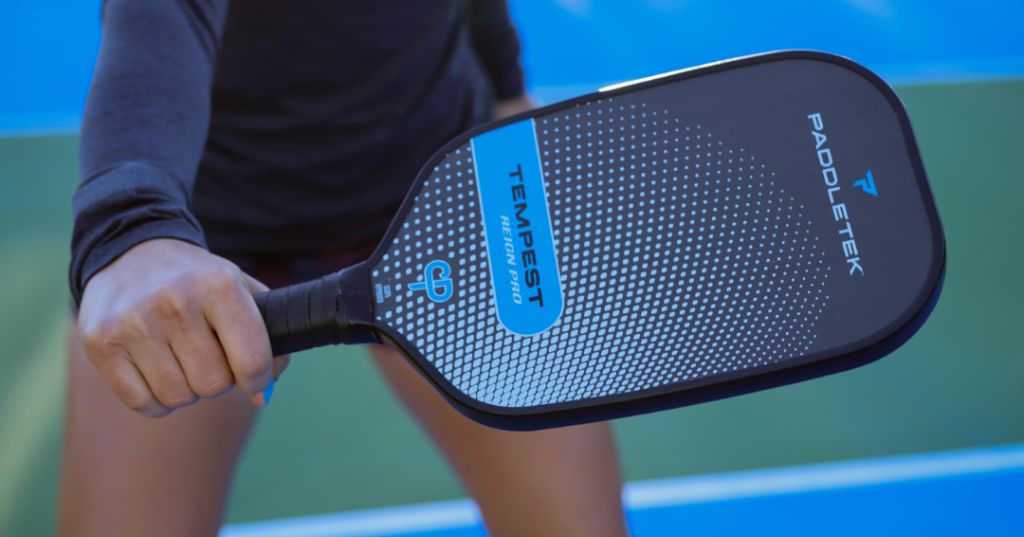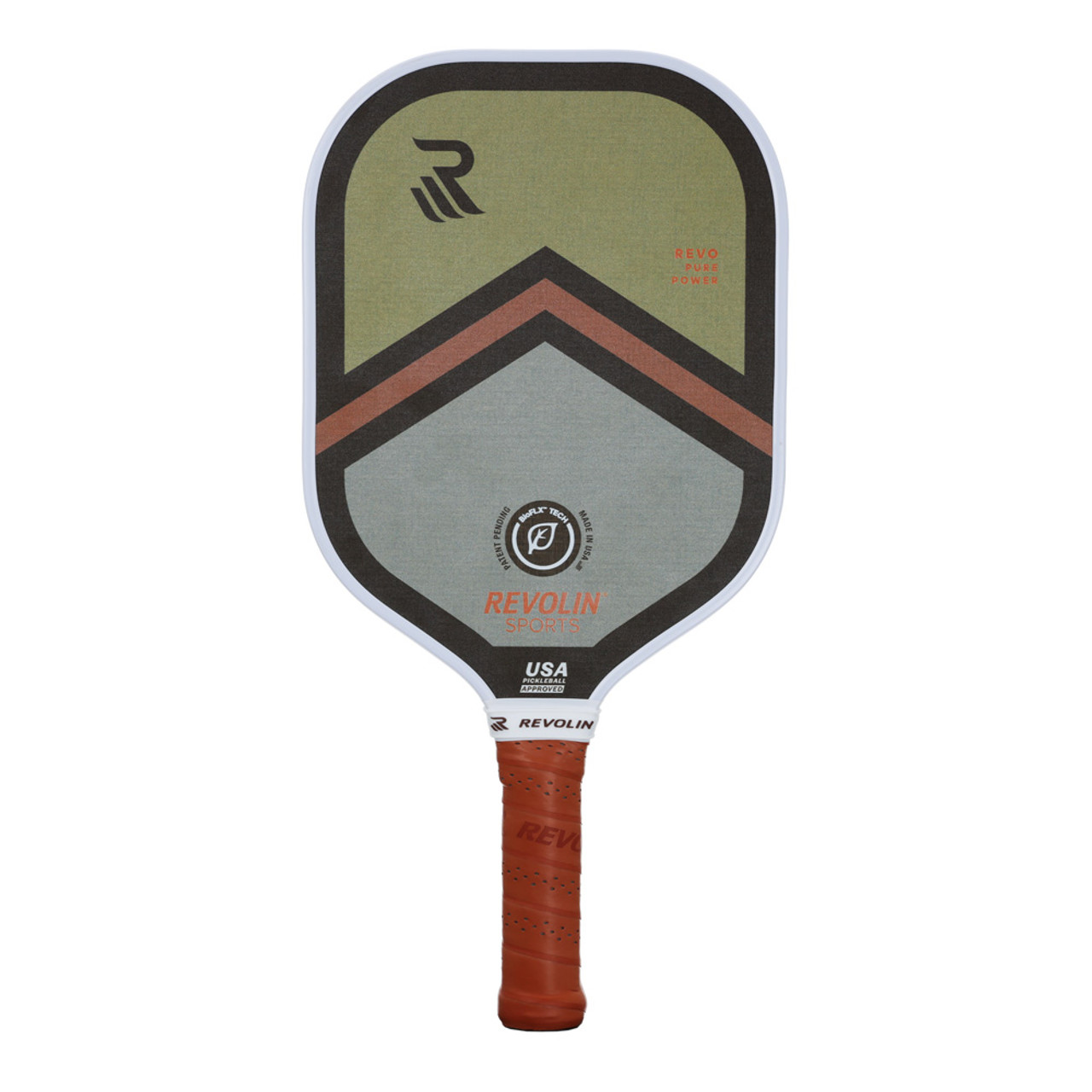A thicker pickleball paddle is better because it improves blocks, resets, and drop shots, while also absorbing the ball’s energy, resulting in less vibration and impact on the player’s body. This can enhance gameplay and provide a more forgiving feel.
When choosing the right pickleball paddle, factors such as weight, core, surface, thickness, grip size, and handle length should all be considered. Thicker paddles offer certain advantages in terms of shot control and comfort, but it’s important to find the perfect balance based on individual preferences and playing style.
Thicker cores provide less power compared to thinner paddles but can be beneficial for players looking to enhance their control and finesse shots.

Credit: www.paddletek.com
Understanding The Impact Of Core Thickness
Explaining The Concept Of Core Thickness
When it comes to pickleball paddles, one important factor that players consider is the core thickness. The core of a paddle is the part that determines its overall performance and feel. The thickness of the core refers to how thick this inner material is. Understanding the concept of core thickness can help players make an informed decision when choosing a pickleball paddle that suits their playing style and preferences.
How Core Thickness Affects Performance
The impact of core thickness on pickleball paddle performance is significant. A thicker core gives you less power when hitting the ball but usually improves your blocks, resets, and drop shots. This is because the thicker core provides more control and precision for these shots. On the other hand, a thinner core tends to offer more power, which can be advantageous for strong hitters and players who rely on aggressive shots.
It’s important to note that the effects of core thickness on performance are also influenced by other factors such as the paddle’s weight, surface texture, and overall construction. Finding the right combination of these features is essential for maximizing your playing style and maximizing your potential on the court.
Myth Vs Reality: Debunking Misconceptions
There is a common misconception that a thicker core automatically equates to a better paddle. While it’s true that a thicker core can improve certain aspects of your game, it’s important to consider your playing style and preferences before making a decision.
It’s crucial to understand that there is no one-size-fits-all solution when it comes to choosing a pickleball paddle. Each player has their own unique style and strengths on the court, which means that what works for one player may not work for another. Instead of focusing solely on core thickness, it’s recommended to consider a combination of factors such as weight, grip size, and paddle construction to find the paddle that best suits your needs.
In conclusion, while core thickness does have an impact on pickleball paddle performance, it is not the sole determining factor in choosing a better paddle. By understanding the concept of core thickness, considering how it affects performance, and debunking misconceptions, you can make a more informed decision when selecting a pickleball paddle that enhances your game.
Choosing The Optimal Pickleball Paddle Thickness
Determining The Ideal Core Thickness For You
When it comes to choosing a pickleball paddle, one important factor to consider is the thickness of the paddle’s core. The core thickness has a significant impact on your gameplay and can affect your performance on the court. Determining the ideal core thickness for you requires some careful consideration.
There are different core thickness options available in the market, including thin, medium, and thick. Each option offers unique advantages and disadvantages depending on your playing style and preferences. Let’s take a closer look at how to determine the ideal core thickness for you:
Factors To Consider In Paddle Selection
- Playing Style: Your playing style plays a crucial role in determining the optimal core thickness for your pickleball paddle. If you prefer a more aggressive playstyle and rely on powerful shots, a thinner core may be more suitable for you. Thinner cores provide more power and pop, allowing you to hit harder shots. On the other hand, if you prefer a controlled and finesse game, a thicker core might be better. Thicker cores offer improved control and precision for shots like blocks, resets, and drop shots.
- Personal Preference: Your personal preference also comes into play when choosing the optimal core thickness. Some players prefer the feel of a thinner paddle, as it allows for better maneuverability and responsiveness. Others may prefer the solid feel and added stability of a thicker paddle. It’s essential to try out different thickness options to see what feels most comfortable and natural for your playing style.
- Arm Strain: Another crucial factor to consider is the potential strain on your arm. Thicker paddles tend to be heavier, which can put more strain on your arm during extended play sessions. If you have a history of arm problems or are more susceptible to injuries, opting for a lighter or thinner paddle with a more forgiving swing weight might be a smarter choice to reduce strain and prevent discomfort.
Finding The Perfect Balance: Weight Vs Thickness
When choosing a pickleball paddle, it’s essential to find the perfect balance between weight and thickness. While thickness affects the paddle’s core and its characteristics, weight also plays a significant role in your overall playing experience.
It’s worth noting that a thicker paddle does not necessarily mean a heavier paddle. Manufacturers have found ways to distribute weight evenly in paddles with different thickness options. However, it’s still crucial to consider the impact of weight on your performance and comfort.
Keep in mind that a heavier paddle may provide more power but may sacrifice maneuverability. A lighter paddle, on the other hand, allows for quicker reactions and easier control but may not generate as much power.
To find the perfect balance for you, it’s recommended to try out paddles with different weight and thickness combinations. Assess how each paddle feels in your hand, how it affects your swing, and how it impacts your shots. This way, you can make an informed decision based on your individual needs and preferences.
Exploring The Benefits Of Thicker Pickleball Paddles
Increased Power And Ball Control
A thicker pickleball paddle can provide players with increased power and better ball control. The added thickness of the paddle’s core allows for a larger sweet spot, which means more power behind each shot. When the ball makes contact with the paddle, the thicker core provides a solid surface to generate more force, resulting in powerful shots that are difficult to return. The increased ball control comes from the paddle’s ability to absorb and distribute the impact of the ball evenly, allowing players to confidently direct their shots with precision.
Enhancing Spin And Shot Placement
In addition to improved power and ball control, thicker pickleball paddles also enhance spin and shot placement. The increased thickness of the paddle’s core allows players to put more spin on the ball, creating curve and unpredictability in their shots. With a thicker paddle, players can generate more topspin or backspin, providing them with a wider range of shot options.
Furthermore, the thickness of the paddle contributes to better shot placement. The larger surface area of the paddle provides players with more space to make contact with the ball, increasing their chances of hitting the desired spot on the court. Whether players aim for the sidelines, corners, or drop shots, the thicker paddle offers improved shot placement capabilities.
Allowing For A More Comfortable Grip
In addition to the performance benefits, a thicker pickleball paddle can also offer a more comfortable grip. The increased thickness provides players with a larger handle, allowing for a more secure and stable grip during gameplay. This helps to reduce hand fatigue and improve overall control of the paddle.
Examining The Drawbacks Of Thicker Pickleball Paddles
Reduced Maneuverability and Speed
One of the primary drawbacks of using a thicker pickleball paddle is reduced maneuverability and speed. Thicker paddles tend to be bulkier and heavier, making it more challenging to make quick, precise movements on the court. This can hinder your ability to react swiftly during fast-paced rallies and may limit your overall agility on the court.
Potential Strain on the Arm and Wrist
Another drawback associated with thicker pickleball paddles is the potential strain they can place on your arm and wrist. The added weight and thickness of the paddle can increase the amount of force exerted on your arm and wrist during swings and shots. Over time, this prolonged strain can lead to fatigue, discomfort, and even injury. It is important to consider your own physical condition and playing style before opting for a thicker paddle.
Adjusting Playing Style for Thicker Paddles
When using a thicker pickleball paddle, it is crucial to adjust your playing style accordingly. Due to the reduced maneuverability and potentially higher swing weight, you may need to modify your technique to compensate for these factors. This may involve incorporating more controlled shots, focusing on accuracy rather than power, and finding the sweet spot on the paddle’s surface to maximize your shots. Practicing with a thicker paddle and experimenting with different techniques can help you adapt to its unique characteristics and make the most of its advantages.
Frequently Asked Questions For Is A Thicker Pickleball Paddle Better
What Does A Thicker Pickleball Paddle Mean?
A thicker pickleball paddle means that it has a thicker core. This can improve blocks, resets, and drop shots while providing more forgiveness and absorption of the ball’s energy. It may result in less power, but it has its advantages.
How Do You Choose The Thickness Of A Pickleball Paddle?
A thicker pickleball paddle absorbs the ball’s energy, improves blocks, resets, and drop shots, and feels softer. It is more forgiving and provides less power compared to thinner paddles. Thicker core paddles are advantageous in reducing the transfer of energy to the body.
Is There Really A Difference Between Pickleball Paddles?
Yes, there is a difference between pickleball paddles. Factors like weight, core thickness, surface, grip size, and handle length affect the playability of the paddle. A thicker core absorbs the ball’s energy, providing more forgiveness and a softer feel. Thinner paddles offer more power.
What Is The Difference Between 14 And 16 Joola?
A thicker pickleball paddle core improves blocks, resets, and drop shots, but reduces power. The paddle absorbs the ball’s energy and feels softer.
Conclusion
The thickness of a pickleball paddle can have advantages and disadvantages depending on your playing style and preferences. A thicker paddle with a thicker core can provide more forgiveness, absorbing the ball’s energy for softer shots and better control. However, it may sacrifice some power.
Ultimately, it’s important to consider factors such as weight, core material, and grip size to find the paddle that suits you best. Choose a paddle that enhances your skills and allows you to perform at your highest level on the court.

